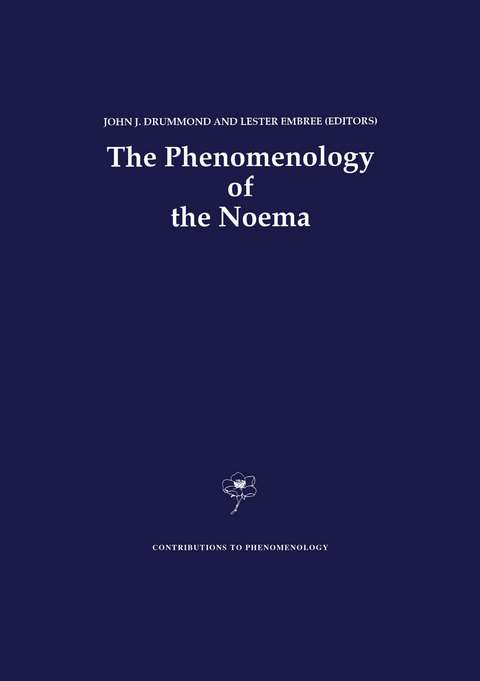
The Phenomenology of the Noema
Seiten
2010
|
Softcover reprint of hardcover 1st ed. 1992
Springer (Verlag)
978-90-481-4207-1 (ISBN)
Springer (Verlag)
978-90-481-4207-1 (ISBN)
Philosophers contributing new ideas are commonly caught within a received philosophical vocabulary and will often coin new, technical terms. Any analysis of the noema of a particular type of experience will necessarily illustrate, at least by instantiating the general notion of noema.
Philosophers contributing new ideas are commonly caught within a received philosophical vocabulary and will often coin new, technical terms. Husserl understood himself as advancing a new theory of intentionality, and he fashioned the new vocabulary of `noesis' and `noema'. But Husserl's own statements regarding the noema are ambiguous. Hence, it is no surprise that controversy has ensued. The articles in this book elucidate and clarify the notion of the noema; the book includes articles which phenomenologically describe and analyze the noemata of various experiences as well as articles which undertake the `metaphenomenological' explication of the doctrine of the noema. These two enterprises cannot be isolated from one another. Any analysis of the noema of a particular type of experience will necessarily illustrate, at least by instantiating the general notion of noema. And any metaphenomenological account of the noema itself will guide particular researches into the noemata of particular experiences.
Philosophers contributing new ideas are commonly caught within a received philosophical vocabulary and will often coin new, technical terms. Husserl understood himself as advancing a new theory of intentionality, and he fashioned the new vocabulary of `noesis' and `noema'. But Husserl's own statements regarding the noema are ambiguous. Hence, it is no surprise that controversy has ensued. The articles in this book elucidate and clarify the notion of the noema; the book includes articles which phenomenologically describe and analyze the noemata of various experiences as well as articles which undertake the `metaphenomenological' explication of the doctrine of the noema. These two enterprises cannot be isolated from one another. Any analysis of the noema of a particular type of experience will necessarily illustrate, at least by instantiating the general notion of noema. And any metaphenomenological account of the noema itself will guide particular researches into the noemata of particular experiences.
1. On the Object of Thought: Methodological and Phenomenological Reflections.- 2. Finding the Noema.- 3. Noema and Essence.- 4. Meaning and Noema.- 5. Noetic Insight and Noematic Recalcitrance.- 6. An Abstract Consideration: De-Ontologizing the Noema.- 7. Being’s Mindfulness: The Noema of Transcendental Idealism.- 8. What Does Noematic Intentionality Tell Us About the Ontological Status of the Noema?.- 9. Some Noetico-Noematic Analyses of Action and Practical Life.- 10. The Noema Revisited: Hard Cases.- 11. A Bibliography of the Noema.- Index of Names.- Index of Topics.
| Erscheint lt. Verlag | 3.12.2010 |
|---|---|
| Reihe/Serie | Contributions To Phenomenology ; 10 |
| Zusatzinfo | VI, 256 p. |
| Verlagsort | Dordrecht |
| Sprache | englisch |
| Maße | 160 x 240 mm |
| Themenwelt | Geisteswissenschaften ► Philosophie ► Erkenntnistheorie / Wissenschaftstheorie |
| Geisteswissenschaften ► Philosophie ► Philosophie der Neuzeit | |
| Geisteswissenschaften ► Philosophie ► Sprachphilosophie | |
| ISBN-10 | 90-481-4207-5 / 9048142075 |
| ISBN-13 | 978-90-481-4207-1 / 9789048142071 |
| Zustand | Neuware |
| Haben Sie eine Frage zum Produkt? |
Mehr entdecken
aus dem Bereich
aus dem Bereich
die Grundlegung der modernen Philosophie
Buch | Softcover (2023)
C.H.Beck (Verlag)
CHF 25,20
Buch | Softcover (2023)
Reclam, Philipp (Verlag)
CHF 9,80

![Was heißt Denken?. Vorlesung Wintersemester 1951/52. [Was bedeutet das alles?] - Martin Heidegger](/media/113619842)
